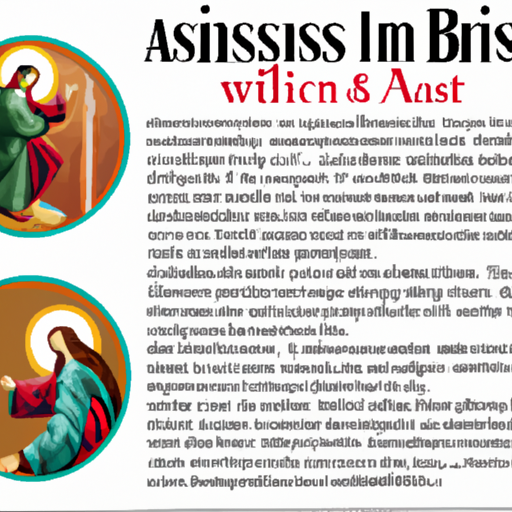In this insightful article, we explore the prophetic role of John the Baptist and how he played a crucial part in preparing the way for Jesus Christ, as foretold in Isaiah 40:3. Discover the important messages he shared, the baptism he performed, and the impact he had on the people of his time. Join us as we delve into the fascinating journey of John the Baptist and uncover the significance of his role in the fulfillment of ancient prophecies.
The Background of Isaiah 40:3
The Context of Isaiah 40
Isaiah 40 is part of the larger book of Isaiah, which is a collection of prophecies attributed to the prophet Isaiah. The book is divided into two main sections, with chapters 1-39 focusing on warnings and judgments against Israel and other nations, and chapters 40-66 emphasizing comfort and hope for the future. Isaiah 40 marks the beginning of this second section and introduces a shift in tone and message.
Isaiah’s Message of Comfort and Hope
In Isaiah 40, the prophet delivers a message of comfort and hope to the Israelites who were in exile in Babylon. The chapter opens with the well-known words, “Comfort, comfort my people, says your God” (Isaiah 40:1). Isaiah reassures the people that their time of punishment is coming to an end and that God is about to restore them. He describes how God will lead them back to their land and promises that their sins have been paid for.
The Significance of the Voice Crying in the Wilderness
Verse 3 of Isaiah 40 states, “A voice cries out: ‘In the wilderness prepare the way of the LORD, make straight in the desert a highway for our God.'” This voice is seen as an important precursor to the coming of the LORD, who is identified as the Messiah. The significance of the voice crying out in the wilderness is that it symbolizes the preparation and readiness of the people for the arrival of the Messiah. It calls for a straightening of the path and a removal of any obstacles that might hinder the people from receiving their Savior.
The Prophetic Role of John the Baptist
John as the Fulfillment of Isaiah’s Prophecy
John the Baptist emerges as a key figure in the New Testament, particularly in the Gospels of Matthew, Mark, Luke, and John. According to these accounts, John is identified as the one fulfilling the prophecy of Isaiah 40:3. The Gospels explicitly link John to Isaiah’s prophecy, emphasizing his role as the voice crying out in the wilderness.
Preparing the Way for the Messiah
Just as Isaiah’s prophecy called for the preparation of the way of the LORD, John the Baptist is described as the one who prepares the way for the Messiah. John proclaims a message of repentance and baptism, urging people to turn away from their sinful ways and prepare their hearts for the coming of Jesus. His ministry focuses on preparing people spiritually and emotionally for the arrival of the Messiah.
The Voice Crying in the Wilderness
John’s identification as the voice crying out in the wilderness is significant in several ways. Firstly, it connects him to the prophetic tradition of the Old Testament, specifically to the message of Isaiah. Secondly, it highlights the unconventional nature of John’s ministry. By choosing to preach and baptize in the wilderness, John distances himself from the religious and political centers of power, symbolizing a call to true repentance and an alternative way of life.

John the Baptist’s Identity and Ministry
The Birth and Upbringing of John the Baptist
The birth of John the Baptist is narrated in the Gospel of Luke. John’s parents, Zechariah and Elizabeth, were of priestly descent but had been unable to conceive a child. However, an angel appeared to Zechariah and told him that Elizabeth would conceive and bear a son, who would be filled with the Holy Spirit from birth. As prophesied, Elizabeth becomes pregnant, and when John is born, Zechariah regains his voice and prophesies about the role his son will play in preparing the way for the Lord.
John’s Calling and Mission
John’s calling and mission are closely tied to his identity as the one fulfilling Isaiah’s prophecy. He understands himself as the messenger announcing the arrival of the Messiah. John recognizes the superior role of Jesus and declares that he is not worthy to untie the sandals of the one who is to come after him. John’s mission is to prepare the hearts of the people and to make them ready for the coming of Jesus.
The Preaching and Baptism of Repentance
John’s ministry centers around a message of repentance and baptism. He calls the people to turn away from their sinful ways and to engage in acts of self-reflection and renewal. John’s baptism is a symbolic act that signifies a person’s desire to change their life and be cleansed of their sins. Through his preaching and baptism, John prepares the people for the forgiveness and salvation that Jesus brings.
John’s Message to the People
Repentance and the Forgiveness of Sins
One of the central themes of John’s preaching is the call to repentance and the forgiveness of sins. He emphasizes the need for individuals to acknowledge their wrongdoing, seek forgiveness, and change their behavior. John understands that true repentance requires a sincere acknowledgement of one’s faults and a commitment to righteousness and holy living. He assures the people that if they genuinely repent of their sins, they will receive forgiveness and find redemption.
Preparing for the Coming of the Messiah
John’s message is primarily focused on preparing the people for the arrival of the Messiah. He urges them to make their hearts ready and turn away from worldly distractions and vices. John emphasizes the need for a personal transformation that is rooted in a deep relationship with God. He encourages the people to build the foundation of their lives on faith, righteousness, and obedience to God’s commands.
The Urgency of John’s Message
John’s message is marked by urgency. The imminent arrival of the Messiah demands immediate action and a change of heart. John warns the people that the time is short and urges them not to procrastinate in responding to his call for repentance. He emphasizes that the consequences of sin are severe and that the judgment of God is at hand. John’s urgency compels the people to take his message seriously and to reflect on the state of their own lives.

John’s Ministry and Impact
People Flocking to Hear John’s Preaching
John’s ministry attracts a significant following, with people traveling to the wilderness to hear his message. His powerful preaching and forceful delivery captivate the masses and create a sense of anticipation and excitement. The people are drawn to John’s sincerity and charisma, recognizing him as a figure of authority and credibility.
Baptism and the Symbol of Cleansing
John’s practice of baptism becomes a central aspect of his ministry. The act of baptism holds symbolic meaning, symbolizing cleansing and renewal. Through baptism, individuals publicly declare their repentance and their desire to change their lives. The act of being immersed in water represents the washing away of sins and the beginning of a new life in obedience to God.
The Impact on Jewish Religious Authorities
John’s message and ministry do not go unnoticed by the Jewish religious authorities. They become curious about his activities and send representatives to inquire about his identity and authority. John openly challenges their religious practices and calls them to genuine repentance. His boldness and uncompromising message create tension and ultimately lead to conflict with the religious leaders of his time.
John’s Encounter with Jesus
Baptizing Jesus in the Jordan River
One of the most significant moments in John’s ministry is his encounter with Jesus. According to the Gospels, John baptizes Jesus in the Jordan River. This event marks the initiation of Jesus’ public ministry and serves as a powerful affirmation of Jesus’ identity as the Messiah. John recognizes Jesus’ superiority and humbly acknowledges that he is not worthy to perform such an act. This encounter solidifies John’s role as the forerunner of Jesus, the one sent to prepare the way and announce his arrival.
The Manifestation of the Holy Spirit
As Jesus is baptized, the Holy Spirit descends upon him in the form of a dove, and a voice from heaven declares, “This is my Son, whom I love; with him, I am well pleased” (Matthew 3:17). This manifestation of the Holy Spirit serves as a divine confirmation of Jesus’ identity and mission. It also affirms the significance of John’s baptism and his role in preparing the people for the coming of the Messiah.
John’s Testimony of Jesus as the Lamb of God
Following Jesus’ baptism, John publicly testifies about Jesus’ identity as the Lamb of God. John points to Jesus as the ultimate sacrifice who takes away the sins of the world. He declares that Jesus is the one who will baptize with the Holy Spirit and fire, further emphasizing the superiority of Jesus’ ministry and the transformative power he possesses.
John’s Imprisonment and Death
The Confrontation with Herod and Herodias
John’s ministry and his bold preaching do not escape the attention of Herod Antipas, the ruler of Galilee. John openly criticizes Herod for his unlawful marriage to his brother’s wife, Herodias. This confrontation leads to Herodias’ resentment and desire for revenge against John.
John’s Imprisonment and Execution
Herod eventually has John arrested and imprisoned, as Herodias seizes the opportunity to eliminate the threat John poses to her dominant position. Despite John’s popularity and his unwavering commitment to his message, he eventually meets a tragic end. Herodias convinces her daughter to ask for John’s head on a platter, and Herod, influenced by his own pride and the pressures of the situation, grants the request. John is executed and becomes a martyr for his unwavering commitment to the truth.
The Legacy and Martyrdom of John the Baptist
John’s imprisonment and death solidify his place as a courageous and faithful prophet. His unwavering dedication to his mission, even in the face of opposition and impending death, serves as an inspiration to all those who seek to stand for truth and righteousness. John’s legacy lives on in the Christian faith, and his martyrdom is remembered as a testament to his commitment to God’s purposes.
The Enduring Significance of John’s Ministry
John as the Fulfillment of Prophecy
John’s role as the voice crying out in the wilderness, preparing the way for the Messiah, is seen as the fulfillment of Isaiah’s prophecy. His ministry and message align with the expectations and hopes of the Jewish people, linking the Old Testament prophecies to the coming of Jesus. John’s identification as the fulfillment of prophecy underscores the continuity of God’s plan and the divine orchestration of events.
The Example of Humility and Righteousness
John’s life serves as an example of humility and righteousness. Despite his popularity and influence, he consistently deflects attention away from himself and toward Jesus. John acknowledges his own unworthiness, recognizing that his role is to point to the one who is greater. His humility and righteousness serve as a model for all believers, highlighting the importance of recognizing our place in the grand narrative of God’s redemptive plan.
John’s Impact on Christian Discipleship
John’s ministry and message continue to have a profound impact on Christian discipleship. His call to repentance and spiritual renewal remains relevant today, as believers are challenged to examine their lives and turn away from sin. John’s unwavering commitment to his mission despite the personal cost inspires and challenges Christians to live with the same level of dedication and faithfulness. His example of courage and perseverance encourages believers to stand firm in their convictions and boldly proclaim the truth.
Comparisons between John and Isaiah 40:3
The Similarities in Their Roles and Messages
Both John and the voice crying out in Isaiah 40:3 serve a similar role in preparing the way for the Messiah. They are both messengers, calling the people to repentance and announcing the arrival of the Lord. Their messages emphasize the need for spiritual readiness and the removal of any obstacles that hinder the people from receiving their Savior. Both John and the voice from Isaiah share a sense of urgency and emphasize the importance of preparing one’s heart for the coming of the Messiah.
The Continuity of God’s Plan and Fulfillment of Prophecy
John’s identification with the voice crying out in the wilderness underscores the continuity of God’s plan throughout history. The prophecy of Isaiah finds its fulfillment in the ministry of John, highlighting the divine orchestration of events and the intentional preparation for the arrival of the Messiah. John’s ministry represents a continuation of God’s redemptive work and serves as a reminder of God’s faithfulness in fulfilling his promises.
The Significance of the Wilderness Imagery
Both John and the voice from Isaiah 40:3 emphasize the wilderness as a symbolic space of preparation and transformation. The wilderness represents a departure from the distractions and comforts of civilization, creating an environment where one can experience solitude, reflection, and communion with God. The barrenness and harshness of the wilderness serve as a metaphor for the spiritual condition of the people and the need for radical change. The wilderness imagery underscores the need for internal and external purification to make one ready for the coming of the Messiah.
The Relevance of John’s Prophetic Role Today
Preparation for the Coming of Jesus in One’s Life
Just as John prepared the way for the physical coming of Jesus, his message resonates with believers today as a call to prepare for the spiritual coming of Jesus in one’s life. John’s emphasis on repentance, renewal, and transformation remains relevant, inviting individuals to examine their hearts and align their lives with the teachings and values of Jesus. The invitation to prepare for the coming of Jesus is a reminder of the ongoing need for spiritual growth and personal readiness.
The Call to Repentance and Spiritual Renewal
John’s call to repentance is a timeless message that challenges believers to continuously evaluate their beliefs, actions, and attitudes. Repentance is not a one-time event but an ongoing process of self-reflection, acknowledgment of wrongdoing, and a commitment to change. John’s message calls believers to confront their sinfulness and turn toward God, seeking forgiveness and transforming their lives through the power of the Holy Spirit.
Recognizing the Prophetic Voices Among Us
John’s ministry compels believers to recognize and respond to the prophetic voices among them. Just as the people of John’s time needed to discern the authenticity of his message, believers today are called to discern the voices that proclaim truth, justice, and righteousness. John’s example teaches believers to embrace humility, test the spirits, and discern the will of God in discerning the prophetic messages of our time.
In conclusion, John the Baptist played a crucial prophetic role in preparing the way for Jesus. His identification as the voice crying out in the wilderness fulfilled the prophecy of Isaiah 40:3, and his ministry had a profound impact on the people of his time and continues to inspire and challenge believers today. John’s message of repentance and spiritual renewal remains relevant, inviting individuals to prepare their hearts for the coming of Jesus. His example of humility and righteousness serves as a model for all believers, and his legacy as a martyr for truth and justice leaves a lasting impact on Christian discipleship. As believers, we are called to recognize and respond to the prophetic voices among us, just as the people of John’s time were called to discern his message. May we, like John, embrace the call to prepare the way for the Lord and live with courage, humility, and unwavering faith in our own lives.







